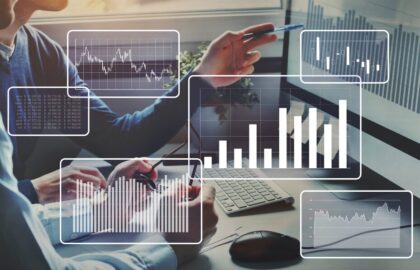The road to the future isn’t paved with asphalt—it’s a path defined by ones and zeros. For centuries, infrastructure was in the hands of physical labor engineers. Today, it’s the masters of data science and software engineers who will move today’s societies into the next stage of technological advances.
In this piece, we’ll examine industry trends in data science vs. software engineering, forecast the direction of both fields, and consider how they’ll impact each other in the future.
Industry Trends in Data Science
Hiring Growth
The industry is actively seeking data scientists. Estimates show data science employment is expected to grow by a staggering 36% from 2021 to 2031. The future is in the hands of skilled data analysts, data engineers, and data architects who can use data analysis to extract valuable, actionable insights.
Gathering Big Data
Projections suggest more than 150 billion devices will be generating 175 zettabytes of data by 2025. Much data will be generated and analyzed in real-time, providing almost-instant feedback for improved results (think content recommendation systems).
These mountains of captured data will drive company decisions, strategies, and future projections. People who can design complex new analytical models and then train machine learning systems on those models will be invaluable.
Analyzing TinyML and Small Data for Data-Driven Devices
The Internet of Things (IoT) has ramped up the need for data scientists who work with TinyML and small data. IoT devices are being developed for nearly every industry, calling for experts to gather and implement that data.
Smart homes. Smart transit. Entire smart cities. All of these call for small, low-powered devices that compute their ML and datasets. These TinyML devices require the expertise of data scientists to collect and analyze billions of data points. They’re then stored in the cloud, streaming new command instructions for these smart devices to act upon in real time.
This is where data science meets the true cutting edge of the future of data-driven devices.
Using AutoML
Analyzing monumental amounts of data collected from databases, platforms, and devices calls for integrating metrics using Automatic Machine Learning (AutoML).
Data scientists will rely on automated tasks to gather accurate data streams. Likewise, industries will need their expertise to define what tasks are suitable for ML and to train ML on their information models to improve accuracy.
Industry Trends in Software Engineering
High Growth
Like data science, software engineering will likely see extremely fast growth. The industry is expected to grow 25% from 2021 to 2031.
For over a decade, businesses have relied more heavily on digital solutions to traditional scaling challenges. From digital platforms to app development in emerging fields like AI and ML, software engineers are in high demand to build the future.
Utilization of Agile Methodology and DevOps
Software development teams have significantly benefited from advances in Agile Methodology and DevOps programming and share centralized datasets while developing quickly and efficiently.
Teams consistently share daily progress in small sections of completed applications, later joined to build a final product. Redundant processes like testing for errors and security issues are automated.
Agile and DevOps will trend upwards together as both continue to benefit from increased usage and advances in AI and ML.
Cloud-Based Platform Development
The reliance on cloud computing will increase. Centralized data repositories shared by development teams, massive amounts of storage, and an added layer of security will help businesses scale at cost.
AI and ML Automation
While the AI and ML fields are currently experiencing an explosion of public interest, they’ve been trending for many years. From every sector, automating processes reliably while using ML to train systems for specific tasks to increase accuracy is critical. The roles of AI and ML in Agile and DevOps are expected to continue driving innovations in development.
Advances in Cybersecurity
Cyber threats are rising exponentially. MoreField’s Cybersecurity 2025 forecast highlights ransomware as one of the most pressing threats, with both frequency and sophistication continuing to rise. From 2023 to 2024 alone, ransomware incidents surged by 81%, emphasizing the urgent need for stronger and more proactive security measures. Paired with a proportionate increase in complexity and sophistication, companies both large and small are seeking news ways to secure their systems against the onslaught.
There will continuously high demand for Software Engineering skills in Cybersecurity to keep systems and information secure.
Mobile App Development
The more we rely on smartphones for our daily needs, the greater the need for mobile-friendly app development and support systems. Whether it’s for companies needing to develop AI-based customer support, for apps using gamification to help people in personal development, or even for GPS-based beacon technology, there’s never been a greater need for mobile-first software development.
The Intersection of Data Science vs. Software Engineering: How the Two Fields Will Impact Each Other
It’s easy to think of these two fields as separate entities – as data science vs. software engineering. But, as multiple revolutionary technologies grow exponentially, we’ll see the intersection of technology fueled by advances in both fields—data science and software engineering.
Increasingly sophisticated software tools will integrate cutting-edge AI and ML, requiring new skill sets from data scientists and software engineers alike.
Software engineers will draw from massive repositories to streamline and optimize code development.
Data privacy and the ethics surrounding intellectual property will call on advanced data analytics. At the same time, combining 5G, IoT, and advances in AR and VR will transform every industry.
Data scientists and software engineers will play fundamental roles in shaping the future of banks, hospitals, customer service, and ethical data mining. At the same time, new fields will be emerging, creating demand for roles that don’t exist yet.
Advances in AI and ML
With new applications developed every day that tap into the power of neural networks and large language models, the world will need analysts and other data experts. Data analysts will formulate how to use millions of new data points. Meanwhile, software engineers will experience increased demand to help companies accelerate data use to gain an edge over competitors.
Programs designed to help the user automate tasks will require the expertise of data scientists and programmers to integrate AI and ML upgrades to features. Companies based on a digital platform model will need constant new integrations for greater datasets from users and features to help the user make smarter, faster purchases using advanced predictive models.
Advances in IoT
IoT is going to change the way we look at the world. Every device, appliance, and gadget will operate on analytics designed by today’s data scientists, with code optimized for even the simplest systems. At scale, everything from traffic patterns on our roads to railways and airport runways will require complex models that other machines will read and interpret.
Cities will rely on well-crafted information systems and dynamic analytics to manage electricity use, waste management, hospital equipment, and other systems. The potential use cases are virtually endless.
Advances in AR and VR
Along with powerful CPUs and other advances, we’ll probably see accelerated movement into practical applications for AR and VR. They’ll factor into production tools, virtual work environments, live events, and virtual game environments — supporting and enhancing experiences in reality. This technology means coding opportunities galore, but it also means opportunities to collect unique new user data.
Advances in 5G
5G does for internet bandwidth what AI is doing for intelligent computing. This technology will open doors for front end developers to design radically upgraded visuals for desktop and mobile.
New predictive models will transform the market in ways we have yet to imagine. Improvement in computing data means collecting real-time information on users and their connections to one another.
Join the Technology Revolution in Data Science and Software Engineering
If you’re considering a future in data science or software engineering, this is your moment. Build cutting-edge skills and join the innovators shaping the future of technology with Flatiron School. Check out our curriculum and apply today!
Frequently Asked Questions
How is data science different from software engineering?
Data scientists focus on extracting actionable insights, trends, and patterns from large datasets to inform decision-making, optimization, and business strategies. They use algorithms, statistical analysis, and data visualization to create predictive models. Possible career pathways include Data Analyst, Machine Learning Engineer, Data Engineer, Data Science Consultant, and Business Intelligence Analyst.
On the other hand, software engineers design, build, and maintain robust software systems, web applications, and user experiences. Their expertise in software development allows them to optimize code, troubleshoot problems, and ensure security and scalability. Possible career pathways include Frontend Developer, Backend Developer, DevOps Engineer, Cybersecurity Specialist, Full-Stack Developer, and QA Engineer. While data scientists focus on “what is” by analyzing and modeling existing data, software engineers work to create “what could be,” developing software applications and optimizing existing systems for scalability, security (including cybersecurity and network security), and user needs.
Which field is right for me: data science or software engineering?
Choose Data Science if you are passionate about working with data to uncover patterns, trends, and insights that drive decision-making. Data science involves tasks like cleaning and analyzing large datasets, building predictive models, and using machine learning algorithms to solve complex problems. If you enjoy statistics, mathematics, and using tools like Python, R, or SQL to manipulate and visualize data, data science might be the right fit for you. This field is ideal for those who are curious, detail-oriented, and enjoy solving real-world problems through data-driven approaches.
Choose Software Engineering if you love coding, designing, and building software systems or applications. Software engineering focuses on creating functional, scalable, and user-friendly software solutions. It involves tasks like writing code, designing system architectures, debugging, and maintaining software. If you enjoy working with programming languages like Java, Python, or C++, and have an interest in creating applications, websites, or systems that people interact with daily, software engineering could be your ideal path. This field is perfect for those who are creative, logical, and enjoy building solutions from the ground up.
What skills should you focus on for each?
- Data Scientists: Programming languages (Python, R, SQL, Java), machine learning (building and deploying machine learning models using frameworks like TensorFlow and Scikit-learn), data visualization (Tableau, Power BI, Excel), big data (Hadoop, Spark, handling large datasets), and statistical analysis (regression, hypothesis testing, and statistical modeling using Pandas, Numpy, and matplotlib), database management (SQL, Oracle, cloud data platforms), communication (translating data insights for stakeholders and hiring managers), problem-solving (tackling data-driven business challenges)
- Software Engineers: Programming Skills (Java, Python, JavaScript, C++), web development (HTML, CSS, JavaScript) and modern frameworks (React, Node.js), system design & architecture (scalable and secure systems, understanding operating systems), version control (Git, GitHub for collaboration and code management), software development methodologies (Agile, Scrum, DevOps for workflow optimization), debugging & troubleshooting (identifying and resolving issues quickly), cloud computing (deploy and manage applications with AWS, Azure, Google Cloud), soft skills & teamwork (communication, project management, and collaboration with cross-functional teams)




